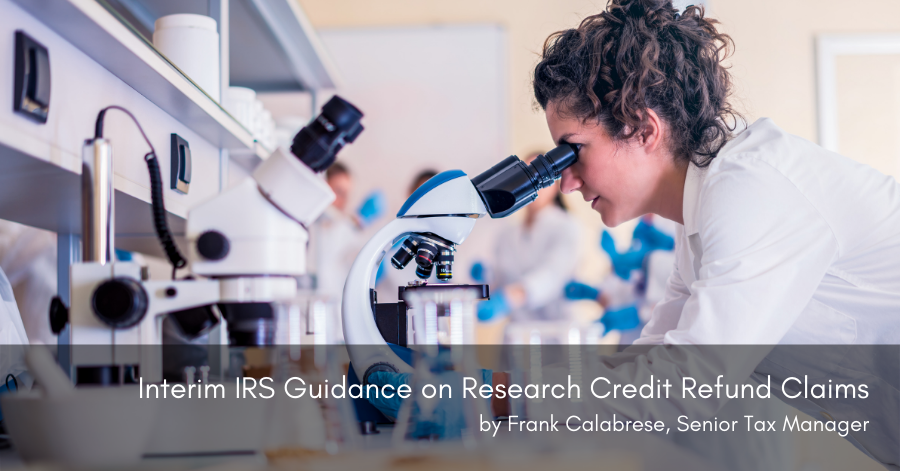By Frank Calabrese, Senior Tax Manager
The IRS has released two pieces of interim guidance on its revised administrative policy regarding valid research credit refund claims, as originally announced on October 15, 2021. On January 3, 2022, the IRS issued procedural guidance for applying the revised administrative policy and, on January 5, the IRS published a corresponding set of frequently asked questions (FAQs) on the policy. Both the procedural guidance and the FAQs are effective for all research credit claims filed for the period beginning January 10, 2022 and ending January 9, 2023.
Background
On October 15, 2021, the Office of Chief Counsel released Chief Counsel Advice Memorandum 20214101F (CCA) that sets forth its revised administrative policy regarding research credit claims. The CCA mandates that taxpayers include certain information along with a research credit refund claim filed under Internal Revenue Code (IRC) Section 41 on or after January 10, 2022, or risk having such claims deemed “deficient” and, thus, rejected without further IRS inquiry. The IRS stated that the CCA is intended to improve tax administration by: (i) providing clear instructions for eligible taxpayers to claim the Section 41 credit; and (ii) reducing the number of disputes over such claims.
The interim guidance regarding the application of the CCA sets out specific procedures that must be followed to determine if a claim is “valid,” including requiring a taxpayer to provide detailed information to the IRS on the grounds and facts upon which a research credit refund claim is based. The IRS will assess the validity of each claim filed on or after January 10, 2022; however, the interim guidance reflects other procedural exceptions the IRS may apply during its evaluation of the validity of a claim. The IRS has committed to make every effort to review credit refund claims as expeditiously as possible and make determinations on such claims within six months of receipt.
Determining the Validity of Refund Claims that Include a Claim for Credit for Increasing Research Activities
Existing Treas. Reg. § 301.6402-2(b)(1) requires taxpayers that are filing a tax refund claim to apprise the IRS of the basis for the claim. According to the CCA and the January 5 FAQs, taxpayers filing an amended research credit refund claim will also be required to provide, at a minimum, five essential pieces of information:
- All of the business components that form the factual basis of the Section 41 research credit claim for the claim year;
- A description of all research activities performed, by business component;
- The first and last names or title/positions of all individuals who engaged in the research activity, by business component;
- The information each individual sought to discover, by business component; and
- The total qualified employee wage expenses, supply expenses and contract research expenses.
In addition to the above minimum criteria, each taxpayer submitting an amended research credit refund claim must submit a declaration signed under penalty of perjury verifying that the facts provided are accurate. For most taxpayers, the signature on Forms 1040X or 1120X serves this function.
The interim guidance also clarifies a particularly burdensome CCA requirement that taxpayers submitting a research credit claim begin explaining the information that each individual sought to discover by business component. Specifically, this information, included under criterion 4, may be submitted as a list, table or narrative, which is beneficial for taxpayers that may have anticipated challenges in reporting this information.
Transition Period and Time to Perfect
For amended research credit refund claims filed during the period January 10, 2022 through January 9, 2023 (“transition period”), taxpayers will be given 45 days to perfect a timely filed claim that is deemed deficient because it failed to provide the five minimum criteria listed above. Notably, this is an extension of the period previously mandated under the CCA, which originally granted only 30 days to perfect such a claim.
Taxpayers that fail to provide the required five minimum criteria will be notified via Letter 6428, Claim for Credit for Increasing Research Credit Activities – Additional Information Required. The 45-day perfection period will begin on the date Letter 6428 is issued. If a taxpayer does not submit sufficient information to perfect the claim pursuant to the process set forth in the letter, the claim will be considered deficient, and the taxpayer will be issued Letter 6430, No Consideration, Section 41 Claim (“Letter 6430”). If the IRS does not receive a taxpayer’s information or the missing information is insufficient following the 45-day perfection period, the IRS will reject the research credit claim without further consideration.
Claims Filed After the Transition Period Ends
A taxpayer that files a research credit claim after the transition period will be subject to the general rules of Section 6511(a) and, thus, will not have the opportunity to perfect a claim that is deemed deficient. The IRS will evaluate each research credit claim based on the same five minimum criteria outlined above and verify that each claim was signed under penalty of perjury. If a claim is determined to be deficient, examiners will issue Letter 6430 to the taxpayer, and reject the research credit claim without further consideration.
Next Steps for Companies
The IRS’s revised administrative policy impacts many U.S. taxpayers that engage in research and development (R&D) activities. As a result, the American Institute of Certified Public Accountants (AICPA), American Bar Association (ABA), National Association of Manufacturers (NAM) and many others have commented on the need for the IRS to delay implementation and resolve potential uncertainty for taxpayers. However, as discussed above and in accordance with the new guidance, taxpayers submitting amended research credit refund claims must be prepared to set forth in detail: (i) each ground upon which a credit or refund is claimed; and (ii) facts sufficient to support the basis for the claim in accordance with the IRS’s new five minimum criteria. Taxpayers must also include with each amended research credit claim a written declaration verifying such facts under the penalty of perjury.
While it is expected that taxpayers will continue to be able to uphold the validity of research credit claims that have previously been filed, taxpayers should consider the IRS’s five minimum criteria for future research credit claims and the potential need to perfect claims the IRS may deem as deficient for failure to meet these criteria.

 Previous
Previous









